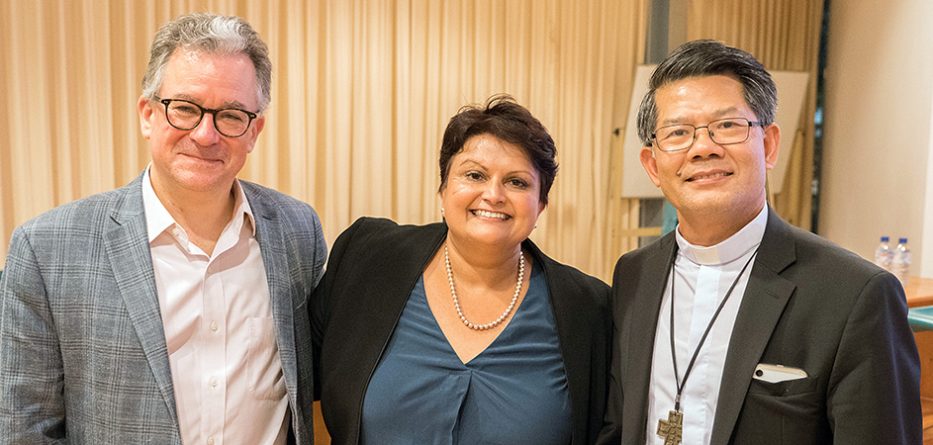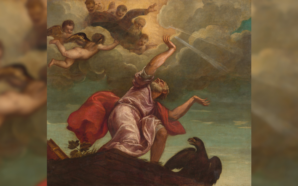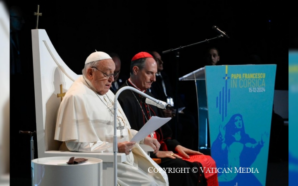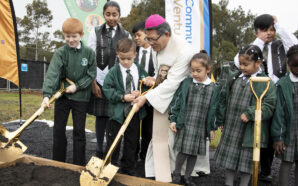Austen Ivereigh is a British writer, papal biographer, journalist, and commentator on religious and political affairs. He gave Adrian Middeldorp from Catholic Outlook the privilege of a wide-ranging two-part interview on Pope Francis, the Catholic Church and the Australian Plenary Council 2020.
Dr Ivereigh holds a PhD from Oxford University. His work appears regularly in the Jesuit magazine America and in other periodicals. He is well known on British media, especially on the BBC, Sky, ITV and Al-Jazeera, as a Catholic commentator. Dr Ivereigh is also a Fellow in Contemporary Church History at Campion Hall, Oxford.
Part One of this interview was published yesterday.
CO: In the sense of his [Pope Francis] popularity, do you believe he shuns that which he commands? He commands a great sense of popularity, but in the same sense is he’s almost trying to deflect it.
AI: I don’t think he doesn’t think like that.
One of the ways that I think the papacy is constantly misread by what we might call the mainstream press is that they apply a political hermeneutic. So they assume, for example, when he called the anti-abuse summit in February in Rome, he was doing so as a reaction and the American press particularly was convinced that it was all in response to McCarrick and the Pennsylvania Grand Jury report. It really wasn’t.
It was was actually much more his own discernment about the global church and particularly the developing world. I don’t think he thinks politically. Now this is on slightly delicate territory because I’ve also said, and I’m saying in the new book as well, is that he’s also one of the canniest and most political Popes I think we’ve ever had in the deeper sort of Aristotelian sense of politics of being the craft of, creating consensus and so on. So I think he’s a genius in that, but what I mean is he doesn’t think politically. He doesn’t think like a politician seeking election. He doesn’t think well, you know, how can I make myself popular in this respect, or overcome resistance here. His thinking really is at the level of spiritual discernment.
So for example when he’s faced with a full frontal attack accusing him or the hierarchy with complicity in the cover up of sex abuse, for example in the case of Archbishop Vigano letter, most people would be concerned about their reputation, would defend themselves, but he chooses not to.
He simply chooses to stay silent because he’s confident that actually what’s needed at the time like this is not to fuel, add fuel onto the fire, but to introduce calm, which then allows the spirits to reveal themselves. And of course he said on the plane coming back from Dublin, one of the greatest things the pope, this pope, has ever said, is ‘go and do your job’, to the journalist. ‘I trust you, your job is to get at the truth’. But he’s not afraid of the truth. You know, ‘let it all come out’.
Actually it took about four days for the Vigano case against Francis to come out but simply because the journalists did do their job, they’re squirreled around and exposed not only his motivations, but the fact that he had deserted. So he’s a pope who has trust, to a remarkable degree, in what he would call ‘the process’ which is how the Holy Spirit acts over time. Part of our problem as human beings is that we want to try to control. Pope Francis contrasts, allows space for the process, we try and control the space, rather than trusting in the in the process. That’s something I’ve learnt a lot over the last year.
Conversion happens in our lives as Christians, but also the institutional life of the church, not out of our own power, but actually through revelation. It is the exposure of the truth. It’s as things come into light that they are revealed for what they are, and that then allows us to respond, as mature human beings. I would sum it up like this: rather than thinking like a politician concerned about opinion polls, he thinks like a spiritual director guiding the church on a retreat, and he sees his role as opening the church up to the grace which God is always offering the church, through a period of tribulation and confusion and his job is to keep to church to that path of conversion. Not allow it to be distracted by the temptation which is to either to flee the pain of the conversion, or to trust in what you might call temporal worldly measures that only serve to reinforce the reason that got us into the mess in the first place.
This is one of the tensions in the abuse crisis is he, particularly I think to the Americans who have wanted in order to appease a public opinion, wanted to introduce new judicial measures and new that’s a distraction. What you need here is a conversion of hearts of minds has taken place and you need to allow that. Of course laws are good, norms and protocols are regular this isn’t like it but it’s about saying at the heart of this is a spiritual matter, which is, you know, you can have as many rules and regulations as you like, but actually if your heart and your mind is not converted than they don’t really add up to very much.
So he’s always looking at the deeper conversion. How God is enabling that conversion, and how he can contribute to that.
CO: That image that you paint of the Pope as a spiritual director leading someone on a retreat is new to me, especially when you think of the church as the body of Christ and it’s perceived biblically. That’s an interesting way to put it.
AI: It’s what Popes have always been doing, but I think he’s so explicit about it. Catholics that get frustrated with Francis because he’s not handing down rules and telling people what to think every day. He doesn’t see that as his role, you know.
His role is, he would say, ‘know what the truth is’, you ‘know what the church teaches’, and of course every time he opens his mouth he’s teaching and he’s teaching the truth of the gospel but his task isn’t endlessly to repeat what we already know.
It is to help to guide us through the concrete here and now.
CO: Getting back to internal Vatican politics. There was a recent headline “Vatican financial reforms in tatters”.
AI: I don’t agree with that.
CO: Can you explain why you don’t agree with that?
AI: Where the church was and where the Vatican was in 2013 and where it is now, it’s a very different place. For a start the church has regulations in place, which simply could not allow what used to happen with the Vatican bank. You’ve got cooperation with Italy, with the Italian security forces, which again is unprecedented. You’ve got a Pope who has actually encouraged the indictment of Vatican officials who, as it were, have been caught with their hands in the till and we’ve actually had officials now being given gaol sentences and forced to pay huge fines. So the culture of impunity has ended. Now there’s still a road to travel.
However, the Vatican has now done, finally, it’s first properly audited accounts but they haven’t yet published them. I think they’re still trying to work out how to communicate some of this stuff. I’m not saying that there isn’t area for further reform, but the level of corruption and the kind of culture of concealment which existed in 2013 has gone.
The proof of that, by the way, you don’t need to take it from me, it’s in the fact that actually European Union, various European institutions now have contracts with the Vatican which they never had. Moreover, the anti-corruption watchdog, has praised the Vatican. The Vatican is now on the white list of countries which have proper procedures. So I think we’ve got international recognition now. The bad old days are genuinely over.
I think Cardinal Pell played a huge role in that. His departure did not lead to a reversal of that process.
CO: Turning towards the work you have done with Catholic Voices, what advice do you have to us Catholic communicators working in chanceries or communications, Catholic newspapers around the world? How can we better communicate the work of the church?
AI: Tell stories.
I mean that I think the role of Catholic communicators is to truffle out the stories that the mainstream press are never going to find on their own, because they’re simply not looking. So there are stories of transformation, and conversion, which is actually the stuff of the gospel.
The gospel spread in the early centuries of the church not because the church is a powerful influencing institution with access to the media with wonderful public relations strategies. It spread through the power of testimony, and that testimony is above all a testament to the working of God in people’s lives, and the the direct experience of mercy and the transformative effect of that.
Putting narrative on that is actually hard, I think. It’s hard to put them into words, but I think, that’s the main challenge for us as Catholic communicators. I think we have to find a way of telling those stories in a way that frankly is interesting and compelling and captivating, whoever you are. Whether you’re a person of faith or not, you know, we are all interested in human transformation, and in social transformation. When we tell the story of what the church is on the ground, I think people start to see and look beyond this institutional meltdown, the failure of leadership which, in a way, in the daily life in the church, is really counts for very little.
The substance of daily Catholic life carries on in spite of all of this. John Allen, used to say, the one story that’s true, that you’ll never read even in the Catholic papers is, ‘Catholics like the church’.
For example, I’ve just been contacted by CNN saying could I comment on the latest survey they’ve done which says, for example, 30% of American Catholics are questioning whether to stay in church.
Well inevitably, you know, when crisis like this happen people who see their Catholicism as a kind of, belonging to a club which is a superior institution of course they’re going to be shocked and of course people like that will be alienated, but I think most Catholics I know who have experienced love and grace and mercy in their lives, they would give the answer of Peter in the gospels, “where else are we going to go you have the message of eternal life.”
CO: In a previous life as a radio broadcaster, I would have listeners ringing in saying the church is full of hypocrites and I would say absolutely, and that’s why we need a church.
AI: We are hypocrites, that’s right. Well I think hypocrisy is a very strange word because, that is the charge isn’t it?
CO: Yes.
AI: Against the church, and of course when you have something like that characterised as huge crises, or I don’t know whether you saw this news but by Frederic Martel on homosexuality in the Vatican.
People say, ‘Oh look, you see it’s all a big facade and beneath it there’s all this, you know, festering load of sin or something’. And to some extent I think that criticism is valid when Catholics put themselves forward using this very dogmatic moralistic language and they’re frankly telling other people what to do. People quite rightly say these people are hypocrites and because when it’s later discovered that they’re leading a double life everybody goes, ‘you know, I told you so.’
So the definition of the word from the Greek, hypokrites, in the sense that Jesus used, means to put on a mask. To preform a role. Now those clergy who were impeccable priests during the day, but they got to the evening took off their collar and then went seeking sexual gratification are hypocrites because they were really preforming a role.
So somehow they think priesthood is something they can stop doing at seven o’clock in the evening. That’s a hypocrite. A hypocrite isn’t somebody who says I’m a sinner, and I’m dealing with dark stuff inside me and I need God’s help to deal with that. That’s not a hypocrite – that’s an ordinary Christian. We need to become much better, I think, at being much more humble about our own power to change ourselves, or change the world.
The power that we claim isn’t our power and it’s not the power of the institution it’s the power of God’s grace.
CO: What are your plans for the future, I know you have a book coming out
AI: The books out in October and I will be in America, because it’s an American book firstly. It’ll be published everywhere else later but at the end of October, beginning of November giving lectures, you know I spent, you know, a lot of my life giving tours. I mean that’s just the way it is, I’m actually doing very little journalism at the moment. I think that’ll change now that I’ve finished the book.
I think my role – and a strong sense of my own, as a lay Jesuit – I do eight day retreats and so it’s become very clear the last couple of years, this is the mission – to help some people understand Francis.
Francis makes the distinction between, it’s a distinction I love actually, between being an intermediary and being a mediator.
Now a mediator is somebody who brings together two sides, and as it were, retreats so that there can be that interaction.
Whereas an intermediary is somebody who grows at the expense of both. So an intermediary is like a middle man. And I really hope as the book’s biographer and now the author of this new book, I’m a mediator, not an intermediary.
I hope that I can help people to understand Francis, and to help to follow him, to understand him and to follow him. If I’ve done that then I’ve done my job and I’ve done my mission. So that’s where I see my life at the moment.
CO: You spent a little time being the Jesuit novice and now you are fellow of Campion Hall, Oxford.
AI: Which I’m thrilled about.
CO: Have you always had that sense that you were a Jesuit laymen or has it become stronger with Pope Francis?
AI: So I was educated by Benedictines then I had contact with the Jesuits actually in my late twenties. First of all in Latin America, and then I joined the society briefly I did the thirty day retreat and afterwards left, but it was a very transformative experience and it was actually what led me into journalism and writing.
I lost touch with the society, individual Jesuits I was in touch with, but not the society, for a long time.
It was the book, The Great Reformer that brought me back in touch with the Jesuits in Argentina and indeed elsewhere. It’s been one of the great fruits of my following of Francis that I’ve become blessed with society again to the point I’m actually quite involved with the society and doing courses now on Francis’ leadership and that kind of thing.
It gives me great satisfaction. And now the Campion Hall is great because previously I was giving tours at particular universities it’s nice not to be just not an author and journalist, but rather, have a bit of an academic title there which more to the point it enables me to be part of a delightful community of scholars in the Jesuit tradition and I feel very at home among them.








